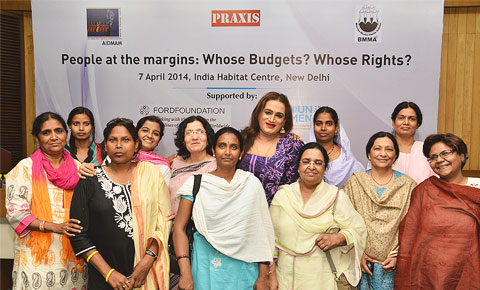Programmes still out of reach for women at the margins, says UN Women
Date:

Briefing paper calls on the Indian Government to respond to the needs of Dalit and Muslim women as well as transgenders
New Delhi - People at the margins: Whose Budgets? Whose Rights? is UN Women’s new briefing paper that recognises the progress made towards gender equality in India but also highlights how women from Dalit, Muslim and Transgender groups continue to experience inequality. The papers are based on studies conducted by the All India Dalit Mahila Adhikar Manch, Bharatiya Muslim Mahila Andolan and Praxis with support from UN Women and the Ford Foundation.
“While the government has introduced special measures for Dalit and Muslim women and transgenders, much more needs to be done for them. In these studies, we examine specific policies meant for these three groups and evaluate the adequacy of budgets and implementation of policies on the ground,” said Rebecca Reichmann Tavares, Representative, UN Women’s India Multi-Country Office at the National Consultation organised to share the key findings of these studies.
“These studies have brought out what the government intended to do and what played out on the ground. For example, teachers who are part of the Kasturba Gandhi Balika Vidyalaya Scheme are on insecure contracts and underpaid. How can we expect them to look after the nutrition needs of school girls in the scheme? We give the least budget where it is most needed – for example for Muslim women,” said Dr Syeda Hameed, Member, Planning Commission at the launch of the study.
Programmes for Dalit women discriminate against them:
- The study examined the Kasturba Gandhi Balika Vidyalaya Scheme (KGBV) in Aurangabad and Munger districts in Bihar – a residential school facility for girls who have dropped out. The study found that though the Scheme promotes education for all, it still reinforces inequalities among the most marginalized. For example, Dalit girls were singled out to clean the KGBVs and the school personnel saw this as a perfectly normal activity.
- The study recommends stepping up budgetary outlays for KGBVs at par with schemes such as Navodaya Vidyalayas in order to realize the vision of inclusive quality education. Since the scheme stops at Class VIII, the study recommends that the schools be extended till Class XII. The study also recommends that KGBVs, which are currently limited to economically backward blocks, should be universalized to all blocks across India.
Prof. Krishna Kumar, Department of Education, Delhi University said: “I commend the idea of an intervention such as KGBV that aims to give a second chance to girls from the most disadvantaged communities. The field evidence suggests that these have in fact been reduced to mere policy symbolism.”
Muslim women remain largely invisible in programmes for religious minorities:
- A study of the PM’s new 15 Points Programme in 4 states reveals that greater policy attention should be paid to Muslim women. For instance, there has not been enough progress for minorities, especially Muslim women, in education, employment, skill development and access to basic amenities.
- Figures revealed by the Ministry of Minority Affairs show that in Gujarat, Tamil Nadu, Uttar Pradesh and Odisha, targets were not set up for Anganwadi Centres in areas with a high concentration of minorities for several years. In other years, when targets were set, achievements were not up to the mark. There were no targets for the construction of primary schools in areas with a high concentration of minorities in Gujarat from 2006 to 2014. Tamil Nadu set a target of constructing four primary schools in the year 2007-08 but built only one.
- Slow credit disbursement to minorities: Microcredit disbursed by the National Minorities Development & Finance Corporation (NMDFC) has increased in terms of funds disbursed and number of beneficiaries. However, term loans provided by NMFDC have declined drastically. The NMDFC is a key agency responsible for credit disbursement to religious minorities.
The social inclusion and rights of transgenders remain shrouded in challenges:
“Giving rights and giving access to transgenders are two different things. I’m happy the issue has come up but achieving access will be an ongoing process. The Government of India should start owning the transgender community as their own citizens with constitutional and human rights,” says Lakshmi Narayan Tripathi, Chairperson, Astitva.
- Transgenders in India continue to face discrimination and stigma. The study raises some critical questions such as the need for greater accountability from families and institutions, and stronger policies to help them assert their identities.
- The performance of the Tamil Nadu Transgender Welfare Board was evaluated to advocate for dedicated institutional mechanisms and policies that can recognize the rights of India’s transgender community.
- A National level Transgender Welfare Board can help to recognize the rights of the transgender community. Transgenders felt that an accessible grievance redressal mechanism can also address day-to-day rights violations against them.
“We are addressing the structural causes of these disadvantages and making concerted efforts to change that mindset. Since a long time, the Ministry has been in a dialogue between youth groups and women’s groups,” said A.K. Jain, Secretary, Ministry for Women and Child Development, Government of India.
NOTES TO EDITORS:
- UN Women is the UN organization dedicated to gender equality and the empowerment of women. A global champion for women and girls, UN Women was established in South Asia to accelerate progress on meeting their rights worldwide. For more information, visit www.unwomensouthasia.org.
- Contact details: Sabrina Sidhu, Communications and Informations Officer, [ Click to reveal ], +919818717522